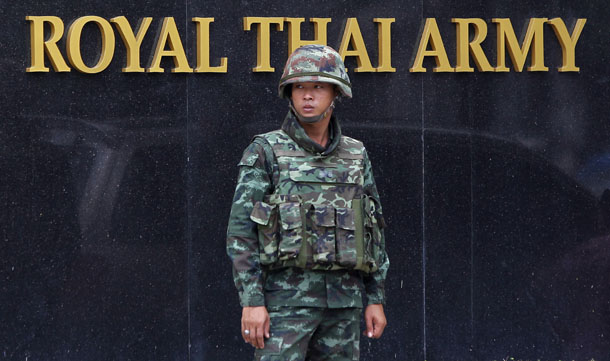BANGKOK — Thailand’s junta on Thursday appointed a military-dominated interim legislature in another step in the slow return of promised electoral democracy.
King Bhumibol Adulyadej’s official endorsement of the appointment was announced on all television stations.
The junta, which took power on May 22, issued a timetable a month ago for the gradual return to nominally civilian rule, culminating in a general election late next year.
The dominance of active and retired military officers in the legislative body reinforces the army’s hold on power in the run-up to the 2015 polls. The junta, officially called the National Council for Peace and Order, has already granted itself what amounts to supreme power over political developments.
Army commander Gen. Prayuth Chan-ocha, who led the coup and has been serving as de facto prime minister, is widely expected to be named the interim prime minister. Even if he does not take the post, he is seen as holding ultimate power in the interim regime.
The interim legislature, formally known as the National Legislative Assembly, includes 105 people holding military ranks and 11 from the police. The 84 civilian members include academics, businesspeople, technocrats and former senators.
The legislature is to convene Aug. 7 and will nominate the interim prime minister, who will then choose Cabinet members.
An appointed reform council will also work with a constitution-drafting committee to create a permanent charter to take effect July 2015, according to the timetable. Neither body has been appointed yet.
The army’s bloodless seizure of power from a government that was elected by a majority of voters three years ago has been justified by Prayuth as necessary to restore order after half a year of anti-government protests and political turmoil that left at least 28 people dead and the government paralyzed.
But since taking power, the army appears to be carrying on the fight of the anti-government protesters by mapping out a similar agenda to rewrite the constitution and institute extensive political reforms. It has quashed most dissent, threatening or arresting critics of the coup.
Critics say the military is seeking to weaken the power of political parties. One idea being discussed is having a portion of future lawmakers be chosen by occupational groups and different social sectors.
Thailand has been deeply divided since 2006, when former Prime Minister Thaksin Shinawatra was toppled by a military coup after being accused of corruption, abuse of power and disrespect for the king.
Thaksin, a former telecommunications billionaire, remains highly popular among the poor in Thailand’s north and northeast, and parties controlled by him have won every national election since 2001. The anti-government protesters, backed by the country’s traditional elites, bitterly opposed him and sought to remove all traces of his influence from politics.
















